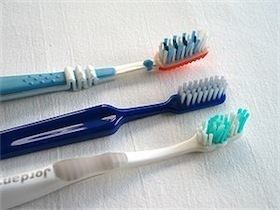Matthew Yglesias's Blog, page 2443
January 21, 2011
Free Market Health Care

Rep Jeb Hensarling (R-TX) sings the praises of the healthcare status quo and explains the problems with a government takeover of the health care system:
The American people don't want it. It's personal.
Here's my story, two days ago, I was in San Antonio, Texas, and my mother had a large tumor removed from her head. They wheeled her away at 7:20 in the morning, and by noon, I was talking to her along with the rest of our family. It proved benign, thanks to a lot of prayers and good doctors at the Methodist hospital in San Antonio. My mother's fine. I'm not sure that would be the outcome in Canada, the U.K., or anywhere in Europe.
No disrespect to our President, but when it comes to the health of my mother, I don't want this President or any President or his bureaucrat or commissions making decisions for my loved ones. Let's repeal it today, replace it tomorrow.
Hensarling is 53 years old, so his mother is, of course, eligible for Medicare. And it's true that Medicare, for all its flaws, is an excellent system of coverage. It's also a system of universal taxpayer-financed government-provided health insurance. Indeed, it's basically the same as Canada's system of universal health care, which is probably why the Canadian program is also called "Medicare." The biggest difference is that in Canada you get Medicare whether you're 8, 18, 38, 68, or 88 whereas in the United States Medicare is only available to senior citizens. But seniors like Medicare! And so do their kids! Of course when it was first introduced Ronald Reagan warned that it would lead to a totalitarian dictatorship, but he was wrong. Just ask Rep Hensarling!


Gender and the Service Economy

Earlier this week, Grist's Dave Roberts was going on one of his twitter-jihads against opponents of "industrial policy" and one key point he's making is where on earth are middle-skilled middle class jobs supposed to come from if not from manufacturing.
I think this is a crucial question to ask, especially because it's really not as closely related to issues about trade and industrial policy as many people think. The fact of the matter is that the long-term trend in US manufacturing output is up even as the trend in employment is down. And that's precisely because greedy for-profit firms don't like to hire lots and lots of people for high-wage labor-intensive work. So over time, they've gotten better and better at replacing people with machines. The edge Chinese workers have over Americans is that they're so cheap (so far) that they're not worth replacing with machines. But their time will come, and the future of mid-skill employment will necessarily entail a loto fo work in human service fields where demand is growing and automation hasn't made much progress.
Meanwhile, yesterday I was in a chair in the oral surgeon's office getting ready to have some prep done and the surgical assistant went to put some gloves on. But after reaching for a pair from the dispenser in the room, he had to run out briefly and get another pair from someplace else. He explained that it's a "female-dominated field" so they never have enough gloves that are big enough for his hands around. And, indeed, as the day went on it was clear that aside from that guy and the (male) surgeon himself, all the nurses and assistants and whatever else they're calleds working in office were women. Which is the kind of thing that's so normal you don't even notice it until someone's talking about glove sizes. I'm not sure exactly why that is, but I guess there's a perception that this kind of "caring" work is less manly than working in a factory. But the various forms of nurse (or advanced nurse) and physician assistant type jobs out there are precisely the type of middle class work for which there's certain to be growing demand in aging, increasingly wealthy societies. Someday probably someone will come up with a way to build robot nurses, but that seems a ways off at this point.
All of which is to say that while there's a lot that while in the short-term the economy mostly just needs more demand, over the longer-haul I think part of what we're going to need is a shift in gender norms.


Growing Wealthier

Kaid Benfield writes up the Center for Clean Air Policy's new study, Growing Wealthier: Smart Growth, Climate Change and Prosperity:
In particular, the authors observe that application of smart growth principles can improve the bottom line for businesses, household budgets and government balance sheets by increasing property values, cutting fuel and infrastructure costs, creating jobs, enhancing public health and strengthening communities. Cities investing in public transportation and downtown development are experiencing cost savings, growing tax revenues, increased property values and booming retail sales, while pent-up demand for walkable communities is reshaping the real estate market.
Lots of things happen under the banner of "smart growth" and I'm sure that not all of them are economically beneficial. But the core idea of smart growth is to use space efficiently. For whatever reason, that idea sort of first took hold in green circles since when space is used efficiently there's less consumption of energy for heating, lighting, and transportation. But the inefficiencies involved in anti-density regulatory mandates and investment priorities are just as much ecomomic growth issues as they are allocative issues.


2010 Was The Hottest Year Ever

It's amazing what a wide array of international players, scientists, etc. are willing to join the left-wing conspiracy to convince you that climate change is a problem:
The U.N.'s World Meteorological Organization said Thursday that 2010 was the warmest year on record, confirming a "significant" long-term trend of global warming and producing exceptional weather variations.
The trend also helped to melt Arctic sea ice cover to a record low for December last month, the WMO said in a statement.
Last year "ranked as the warmest year on record, together with 2005 and 1998," the WMO added, confirming preliminary findings released at the global climate conference early December that were based on a 10-month period.
The fact that all three of the hottest years ever came within the past 15 years is really even more disturbing in terms of illustrating where the trends are headed. Meanwhile, Dave Roberts notes that the Republican Study Committee's proposed budget entails deep cuts to clean energy and energy efficiency programs:
Energy Star Program: $52 million a year. Intercity and High Speed Rail Grants: $2.5 billion a year. DOE Weatherization Grants to States: $530 million a year. Amtrak Subsidies: $1.565 billion a year. (There are no cuts to highway subsidies, of course.) Technology Innovation Program: $70 million a year. (Wait, I thought support for innovation was "post-partisan"!) Applied Research at Department of Energy: $1.27 billion a year. New Starts Transit: $2 billion a year. Subsidies to the United Nations Intergovernmental Panel on Climate Change: $12.5 million a year. Title X Family Planning: $318 million a year. Appalachian Regional Commission: $76 million a year. (Why do we need this? They already have coal mines there!) FreedomCAR and Fuel Partnership: $200 million a year. Subsidy for Washington Metropolitan Area Transit Authority: $150 million a year. National Organic Certification Cost-Share Program: $56.2 million a year.
Obviously any program of deep cuts to domestic discretionary spending is going to slice some good energy programs. But what's really noteworthy about the RSC budget is what it doesn't cut. There are no reductions in subsidies for highways-building, for fossil fuel production, or for farmers so in addition to doing nothing to overcome our dirty infrastructural legacy, they'd have us continue full speed ahead on deepening our dependence on oil-powered vehicles and coal-fired power plants.


Shockingly Little is Rotten in Denmark

Max Chafkin of Inc goes to the socialist dystopia of Norway and finds that it's a hotbed of entrepreneurship. He makes various excellent points in the course of doing so, but I do always think people need to be careful when talking about Norway since they're so rich (on a per capita basis) in terms of oil and gas reserves. The primary thing Norway is a good example of is excellent management of natural resources, a score on which many resource-rich countries have fallen down.
But what if Chafkin had hopped on a plane and flown to Copenhagen? I was struck to learn recently that a Heritage Foundation / WSJ op-ed page survey decided Denmark has more "economic freedom" than the United States of America. Well, it also has taxes as a much higher share of GDP, much less inequality, stronger labor unions, and it's dramatically "greener" in terms of per capita (or per unit of GDP) carbon emissions. It seems to me that all things considered, progressives would gladly make the swap. And apparently conservatives would, too.


You've Got Ripped Off! AOL's Scam Economics

The economics of scams continues to be, in my opinion, an underexplored subject. Here Nicholason Carlson from Business Insider extracts the fact that AOL's business at this point is mostly dependent on a pretty crude ripoff—selling internet access to old people who already have internet access:
In his big New Yorker profile on AOL this week, Ken Auletta explained that 80% of the company's profits STILL come from AOL's subscription business.
What's troubling about AOL's subscription business is who the subscribers are and why they may be sticking around – in Auletta's words, "older people who have cable or DSL service but don't realize that they need not pay an additional $25 a month to get online and check their email."
A former AOL exec explains that this is AOL's "dirty little secret" – "that 75% of the people who subscribe to AOL's dial-up service don't need it."
Auletta's piece isn't online, so I'm going to check it out in print. But here's an audio feature with Auletta talking about it. If we take these numbers seriously, that means 60 percent of the profits of what's still a major enterprise are coming from a high-volume, small-scale scam.
I think this sort of issue deserves more attention in part because as the economic pie grows bigger and bigger, the number of hours in the day doesn't grow. So in many cases the opportunity cost of taking the time to really check things out is rising. That means more and more often it'll be the case for consumers to be rationally ignorant about what exactly they're doing, and it'll more and more make sense for firms to exploit that. Meanwhile, across the developed world the number of scam-prone elderly people is increasing and rapid growth in the developing world is creating a potentially giant class of marks who don't have generations of inoculation to the panoply of modern marketing techniques.


Bill Kristol, Gold Bug
One of the really shocking things about the modern American conservative movement is that it contains many influential figures whose thinking about public policy is of lower quality than Bill Kristol's. His latest notion is that we should side with China against Ben Bernanke and then adopt a gold standard:
China hawks and American hegemonists (I'm both) will be tempted to jump on this statement as a challenge to the U.S., which in a way it is. But it's worth overcoming for a minute our (justified) distaste for the Chinese regime, and pausing to ask this: Isn't Hu in this one respect right? And does the current international currency system of fiat money, with the U.S. as the reserve currency, serve U.S. or world interests?
And it's worth further asking–as more and more people are beginning to ask–whether a modernized international gold standard, which anchors currencies to a standard outside government manipulation, wouldn't better serve the interests of free and limited government both at home and abroad. After all, it's the dollar's status as a reserve currency that has allowed the U.S. government to amass huge debts, debts which the legislatively imposed debt ceiling has been unsuccessful in limiting. Fiat currency seems to be related to bloated and unlimited government, and to speculative bubbles, and to international instability. Do we just to have to live with this, or simply hope for better Fed chairmen?
If Kristol seriously thinks there were no asset price bubbles or market panics before FDR took us off the gold standard, then he really needs to think harder. Like how did FDR get elected? And why did he take us off the gold standard?
But beyond the specific facts, it's the logical structure of the argument that's insane. Economic growth is a key predicate for an expansive welfare stare. So it's completely true that if you just started throwing out the key institutional features of modern market economies that you'd strange big government. But you'd be strangling big government by destroying the economy. Why do this? It's like economic conservatism as a religion, with small government a totem to worship at.


Free Dental Hygenenists

My adventure in oral surgery has prompted various cracks about my earlier blogging against the dentists cartel. I would say that, realistically, the experience just really strongly underlines the case for reform in this regard. The basic fact of the matter is that I, as a patient, am and was very capable of discerning a situation like "it's been 12 months since my teeth last got cleaned, so I should go to the dentist" and a situation like "I've had 48 hours worth of intense pain in the back of my lower right jaw so I should go to the dentist." The former scenario obviously doesn't require an actual dentist, whereas the latter does. And if dental hygenists were allowed to work on their own, not only would this be good for hygenists (a lower-wage and female-dominated profession, and thus a progressive thing to do) it would almost certainly make it cheaper and/or more convenient to get your teeth cleaned.
This is all on some level, I think, a much bigger deal than people realize. Dentistry is a bit peripheral to the "health care issue" in the United States, but it's really very important to human welfare. Tooth pain sucks! Some commenters mentioned yesterday that one of the nice things about the John Adams miniseries was how it really emphasized the way that chronic tooth pain was a near-universal feature of early 19th century life once people passed a certain age. Making it as cheap and convenient as possible for people to avoid these scenarios does a lot to raise living standards. Obviously in part that can be read as a good reason to pay for poor people's dental bills. But at the end of the day, making these services affordable really does require us to find ways to make delivery cheaper.


January 20, 2011
Endgame
Before I sputter out:
— The limits of corporate personhood.
— The most "most emailed New York Times article" of all time.
— Bloggers beat professionals at Apple forecasting.
— The executive director of Human Rights Watch got a prime seat at the China state dinner.
— Yes it can be rational to vote.
— John McWhorter thinks hard drugs "should be available in maintenance doses, possibly for free."
For dental surgery, it's Eels, "Novocaine for the Soul".


The Case For Bromance
Ann Friedman writes about straight men and social support networks:
From an early age, most women are socialized to be more nurturing and relationship-oriented than men, so perhaps this isn't surprising. My guess is that homophobia also plays a huge role. Men are taught to perceive intimacy with other men as gay. You can see it in trend stories about "man-dates" and movies about male friendship, which often veer pretty quickly from depictions of platonic affection to defensive homophobia. There's even a social stigma attached to cross-gender friendships. Just ask Slate's Juliet Lapidos and her best friend, Jeff. Or me and my bestie Josh. (No, he's not gay. No, I'm not gay. No, we've never dated. Yes, we are super tight.) If all of these relationships are socially off-limits, who's a man to befriend?
I thought about this gender gap in support networks when I read the Times article about Jared Loughner. For all of the explanations that have been offered for his actions — a culture that glorifies violence, easy access to guns, poor access to mental health care — Loughner's lack of a strong emotional and social support network has not been a prominent part of the post-tragedy narrative. It's been taken as a given that this young man was a loner. We've come to expect that perpetrators of headline-dominating acts of violence will be young, single, heterosexual men like Loughner.
There are consequences to the fact that many men don't have the social support they need and deserve. I think this is changing as our societal understanding of gender evolves. But it's changing slowly. I, for one, can't wait until bromance is not just a punchline but a part of every dude's life.
I thought of this today when I was getting ready to be anesthetized and have my teeth pulled. I had put down on some form that Kate Crawford was going to pick me up, and from there basically everyone just assumed (accurately) that she's my girlfriend. It wasn't an unreasonable assumption, per se, but it's emblematic of the phenomenon Ann's talking about here. In practice, a straight single man who reaches out for help will almost always find that people are ready to be there for him. But there's no socially validated way to do so.


Matthew Yglesias's Blog
- Matthew Yglesias's profile
- 72 followers



